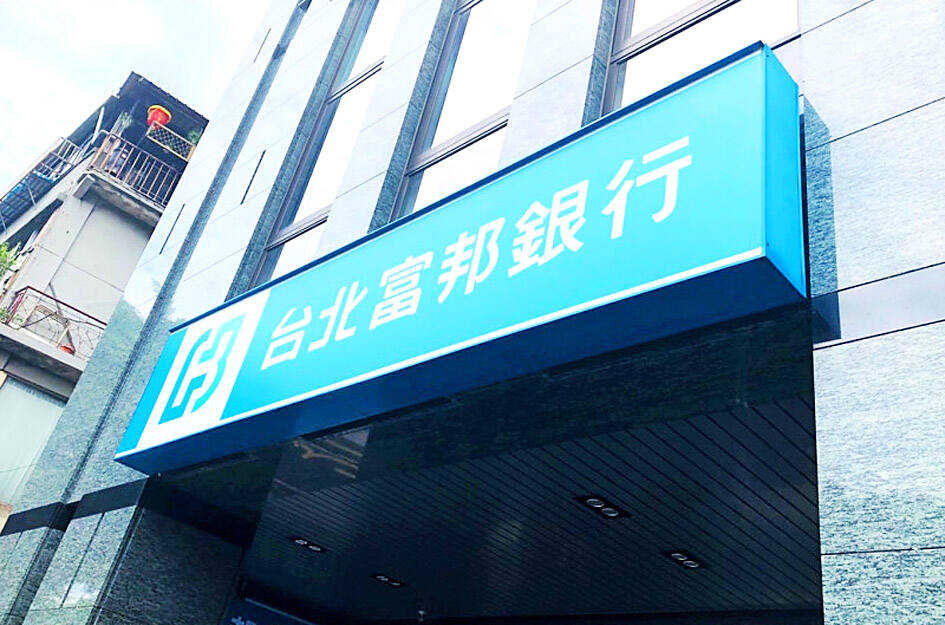Taipei Fubon Bank Co (台北富邦銀行) has secured approval from the Financial Supervisory Commission (FSC) to open a branch in Mumbai, India.
The FSC said in a statement yesterday that Taipei Fubon Bank — a subsidiary of Fubon Financial Holding Co (富邦金控) — had taken into account the Indian market’s current and long-term growth prospects before deciding to set up a branch in Mumbai.
The planned branch is expected to help Taiwanese investors in India and local Indian enterprises access financing opportunities, including international syndicated loans, it said.

Photo: Kelson Wang, Taipei Times
The commission therefore issued the green light to Taipei Fubon Bank to seek approval from financial authorities in India to open a branch in the Indian financial hub.
If successful, it would be the fourth Taiwanese bank to set up shop in India, it added.
So far, CTBC Bank (中國信託銀行) has two branches in India, one in New Delhi and the other in Sriperumbudur, while Bank of Taiwan (台灣銀行), the largest Taiwanese lender, and Mega International Commercial Bank (兆豐銀行) each have a representative office in Mumbai.
India is one of the 18 countries targeted by the government’s New Southbound Policy, which aims to enhance trade and exchanges between Taiwan and the 18 countries in Southeast and South Asia, as well as Australia and New Zealand, to reduce Taiwan’s dependence on China. It was introduced after President Tsai Ing-wen (蔡英文) took office in 2016.
As of the end of last month, Taipei Fubon Bank had overseas branches in Vietnam’s Ho Chi Minh City, Hanoi and Binh Duong, as well as in Hong Kong and Singapore, the FSC said, adding that the bank owns a subsidiary — Fubon Bank — in China.
In addition, it has representative offices in Jakarta, Indonesia, and Sydney, Australia.
Fubon Financial last month retained the title of most profitable financial institution in Taiwan after it posted a net profit of NT$14.07 billion (US$446.3 million), up 131 percent from a year earlier, with earnings per share of NT $10.8.
Taipei Fubon Bank also posted a new monthly high of almost NT$3.5 billion in net profit that month.

Vincent Wei led fellow Singaporean farmers around an empty Malaysian plot, laying out plans for a greenhouse and rows of leafy vegetables. What he pitched was not just space for crops, but a lifeline for growers struggling to make ends meet in a city-state with high prices and little vacant land. The future agriculture hub is part of a joint special economic zone launched last year by the two neighbors, expected to cost US$123 million and produce 10,000 tonnes of fresh produce annually. It is attracting Singaporean farmers with promises of cheaper land, labor and energy just over the border.

US actor Matthew McConaughey has filed recordings of his image and voice with US patent authorities to protect them from unauthorized usage by artificial intelligence (AI) platforms, a representative said earlier this week. Several video clips and audio recordings were registered by the commercial arm of the Just Keep Livin’ Foundation, a non-profit created by the Oscar-winning actor and his wife, Camila, according to the US Patent and Trademark Office database. Many artists are increasingly concerned about the uncontrolled use of their image via generative AI since the rollout of ChatGPT and other AI-powered tools. Several US states have adopted

A proposed billionaires’ tax in California has ignited a political uproar in Silicon Valley, with tech titans threatening to leave the state while California Governor Gavin Newsom of the Democratic Party maneuvers to defeat a levy that he fears would lead to an exodus of wealth. A technology mecca, California has more billionaires than any other US state — a few hundred, by some estimates. About half its personal income tax revenue, a financial backbone in the nearly US$350 billion budget, comes from the top 1 percent of earners. A large healthcare union is attempting to place a proposal before

KEEPING UP: The acquisition of a cleanroom in Taiwan would enable Micron to increase production in a market where demand continues to outpace supply, a Micron official said Micron Technology Inc has signed a letter of intent to buy a fabrication site in Taiwan from Powerchip Semiconductor Manufacturing Corp (力積電) for US$1.8 billion to expand its production of memory chips. Micron would take control of the P5 site in Miaoli County’s Tongluo Township (銅鑼) and plans to ramp up DRAM production in phases after the transaction closes in the second quarter, the company said in a statement on Saturday. The acquisition includes an existing 12 inch fab cleanroom of 27,871m2 and would further position Micron to address growing global demand for memory solutions, the company said. Micron expects the transaction to